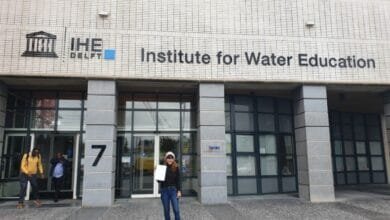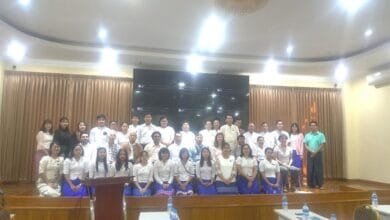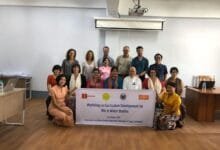
Dr. Wutyi Naing, a postdoctoral researcher at Kyoto University
“We are trying to control the quantity of faecal sludge by monitoring the collecting trucks on (1) where they are heading, (2) how much amount of sludge is on them and (3) the starting time and the route of the trucks by installing weight sensors and GPS tracking based on IoT technology,”
by Author
If you are interested in organic waste management, this article is a perfect fit for you. You are about to read the research findings of Dr. Wutyi Naing on anthropogenic (human-induced) organic waste management in Mandalay. We have interviewed about her experience and findings on her Ph.D research studies, and ongoing progress of her postdoctoral project, the fecal sludge and onsite sanitation management in Mandalay.
Regarding to the educational background, Dr.Wutyi Naing had studied Pharmacy at University of Pharmacy, Mandalay, master of Environmental Engineering and Management at Asian Institute of Technology, and Ph.D in Environmental Engineering at Kyoto University. Currently, she is a postdoctoral researcher in Global Environmental Studies at Kyoto University and operating as a local project coordinator for her postdoctoral project, iFOM-IoT-based Fecal sludge and Onsite Sanitation Management.
Research Findings and Experiences
Her Ph.D research was concerned with the analysis of anthropogenic organic wastes flow from five urban townships (Aung Myae Tharzan, Chan Aye Tharzan, Mahar Aung Myae, Chan Mya Tharzi and Pyi Gyi Dagon) within Mandalay city, including wastes from;
- Onsite sanitation: septic tank, pit latrine and onsite sanitation effluent leakage
- Households: wastewater, solid waste
- Industries: wastewater and solid wastes produced from industries
- Livestock: wastewater produced from the livestock farms
- Agriculture: agricultural runoff
Her vision was to collect more statistical data for the better improvement and sustainable development of sanitation system in Mandalay. To present the amount/ flow of waste production, she used material flow analysis (MFA), an analytical method to quantify flows in a well-defined system. She emphasized on the flow of nitrogen and phosphorous production and for the required statistical data, she interviewed 400 households and other stakeholders like industrial managers, livestock owners, farmers and government experts. Based on the results of the MFA, she briefly described her research findings as follows;
Sludge and onsite sanitation management
The Water and Sanitation Department of Mandalay City Development Committee is the only formal faecal sludge emptying service provider (FP) in the study area and the service system is still a passive system which household calls the emergency on-call service only when the septic tank is full. Due to the lack of sufficient resources; like not having enough collector trucks to service all the emergency calls, people have to wait until it gets their turn. So, they try to shorten the waiting time by contacting individual collecting truck drivers by phone, requesting to empty the septic tanks and paid higher fees to the drivers. This leads to the emergence of informal emptying business and loss of revenue for a formal service provider (FP).
Moreover, the faecal sludge treatment system in Mandalay is the oxidation pond system, which the collecting trucks dump the faecal sludge at a pond area in the open space. The capacity of the pond is comparatively small for the demand and hence, the treatment is not much effective. It can be said that the system is not functioning well and need more improvement to meet the amount of sludge produced from the city. In addition, the collected faecal sludge by the informal emptying businesses was improperly discharged, thus, leading to illegal dumping and impacts the environment.
For future improvement of the treatment system, to investigate both the quality and quantity of faecal sludge produced from the city play an important role. Thus, illegal dumping must be controlled to know the exact amount of design sludge, to prevent environmental pollution and to avoid public health problems. Similarly, the regular emptying of the onsite sanitation facilities such as septic tanks and pit latrines is needed to control the quality of the faecal sludge. Therefore, the monitoring system for the faecal sludge management must be improved, and rules & regulations should be set up on the design criteria of the sanitation facilities, emptying and transportation of the sludge as well as treatment and disposal of the sludge.
“I heard that nowadays, there are regulations set out, increase in the number of collecting trucks, and the authority has been divided into township level for the faecal sludge management. That is great progress and but still need to improve the inspection of the system,” she added.




Household organic waste management
For organic waste, since there is no treatment for greywater, the drains are used to directly discharge them. Also, almost all of the food wastes from the households and markets are directly discarded as landfill without fulfilling any resource recovery. Food wastes increase the organic and moisture content of landfill which then increase the leachate (liquid extracted from the organic wastes) and production of greenhouse gases. Hence, waste separation and improvement of resource recovery are needed to be considered in the future.
Industrial waste management
Most of the industrial wastes are directly disposed into Duthawadi river without any treatment. Some industries have preliminary ponds for treatment but most of those weren’t functioning properly. Shutdown is the only action that has been controlling the industries, which were informed to dispose waste without any treatment. It impacts on the livelihood of the workers and local economy.
Livestock waste management
For livestock sector, although the sludge from the large scale farms are used to produce the fertilizer, for medium and small scale farms, the sludge are washed into the drain directly which then have negative impacts on the environment, quality of drain and the health of the people in the neighborhood.
Agricultural waste management
Chemical fertilizers are mostly used in agriculture and the runoff from those fields can have negative impact on the environment. Within the study area, the agricultural land area is not even 1% of the total area, so, this effect isn’t prominent. But, for larger areas with this level of usage of chemical fertilizer, it can have great impact on the environment. In these cases, it is needed to educate the farmers on how the excess use of fertilizer impacts on the environment and try to provide the organic fertilizer that can meet the fertilizer standards with easy access and affordability.
She also went site visits to Huế and Hanoi, Vietnam and Thailand to study waste management systems and river water quality testing.
“Quality control of river, drainage and waste management systems in those countries are more developed compared with Myanmar. But still, not all system is perfect and there were also some problems regarding to the estimation of quality and quantity of wastewater to meet the design criteria of the system,” she added.


Ongoing Progress of Postdoctoral Research
Her current postdoctoral project, iFOM-IoT-based Fecal sludge and Onsite Sanitation Management project is a winner project of “Innovations for WASH in Urban Settings” by the Bill & Melinda Gates Foundation. The idea and concept of this project is based on her PhD thesis and the baseline data resulted from her master thesis. Altogether with the young multinational team which includes local coordinators from Myanmar, Vietnam, Thailand, and Japan, she has been carrying out the project as a representative of Kyoto University.
“We are trying to control the quantity of faecal sludge by monitoring the collecting trucks on (1) where they are heading, (2) how much amount of sludge is on them and (3) the starting time and the route of the trucks by installing weight sensors and GPS tracking based on IoT technology,” she explained the ongoing progress of the project.
Together with her team, she also developed a mobile application to be able to register the septic tanks, by which the time to de-sludge the tank can be estimated and the households can be informed before the tank is over accumulated or blocked.
Suggestion for younger generation
Few suggestions came up from her experience for upcoming learners who are going to do master and Ph.D thesis. During the period of PhD thesis, she had to adopt some data from the existing available literature of similar population and geographic conditions due to time and resource limitation. Therefore, she would like to recommend for the younger generation who will carry out similar research to consider and investigate the unit pollution loading in organic wastes such as greywater (g/cap/day) and faecal sludge (g/cap/day) for the study area.
“Moreover, I would like to suggest younger generation to explore more to find out their passion, and learn in-depth of the things they passionate with a commitment,” she suggested considering the optimistic vision of the future.
You can read compilation of her thesis in the following links down below.
- Informal Emptying Business in Mandalay: Its Reasons and Financial Impacts
- Nitrogen and Phosphorous Flow Analysis with Focus on Anthropogenic Organic Wastes: A Case Study in Mandalay, Myanmar

















